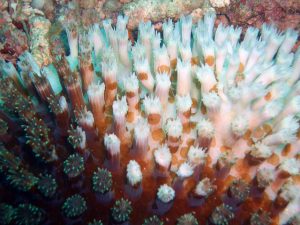 From super corals in the Arabian Gulf, basil planting in Palestine to aviation and Saudi Arabia’s mixed climate message
From super corals in the Arabian Gulf, basil planting in Palestine to aviation and Saudi Arabia’s mixed climate message
It’s been another busy week here at GreenProphet and we hope you’ve been enjoying our news offerings. We’ve covered everything from pink farming (yep, you read right), the shocking NASA images of Iran’s salt lake Urmia and Laurie also launched our very own plastic bag challenge. If you are still after more green news from the region, then enjoy our hand-selected news snippets for the week.
Saudi Arabia’s Mixed Climate Message
After impressing the international community by ditching its climate-skeptic climate negotiator (yes, the irony), Saudi Arabia takes a step back. According to reporting from Grist, Saudi Arabia and various other countries such as the US have been pressuring the European Union to reverse its decision to include aviation in its Emission Trading Scheme. The ETS programme states that all planes flying to or from the EU must be part of a scheme which puts a decline cap on the emissions of the sector.
:: Grist
Basil Planting In Palestine
Although not a local herb or something which is used in the cuisine, Palestinian farmers have taken to growing basil. According to Al Arabiya, farmers in Jericho are relying on basil to make a living by shipping it out to lucrative European and American markets. There are approximately 120 dunums of land planted with basil which produces every four months. I wonder how long it will be before locals are making the most of delicious herb!
:: Al Arabiya
Does the Middle East Have Super Corals?
As corals the world over suffer due to slight temperature changes, those around the Middle East seem more resilient. A marine biologist at New York University Abu Dhabi (NYUAD) Institute found that whilst corals in the Great Barrier Reef start to bleach at around 30C, those in the Persian Gulf can tolerate up to 35C before they start turning white.
:: Nature Middle East
Greenpeace’s Fukushima Lessons For MENA
This week, Greenpeace released a new report titled “Lessons from Fukushima” which concludes that the failure of the Japanese government to acknowledge the risks of nuclear power led to the disaster at the Fukushima. Jan Vande Putte, Greenpeace International nuclear campaigner added: “This report shows that nuclear energy is inherently unsafe, and that governments are quick to approve reactors, but remain ill-equipped to deal with problems and protect people from nuclear disasters.” Jordan and other Middle Eastern countries on the path to nuclear power need to contemplate the lessons of Fukushima more than anyone.
:: Greenpeace
:: Image via articotropical/flickr.


